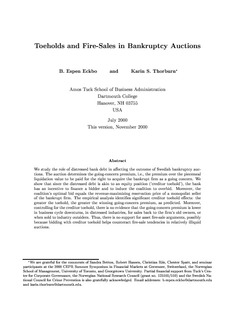Toeholds and fire-sales in bankruptcy auctions
Working paper
Permanent lenke
http://hdl.handle.net/11250/164071Utgivelsesdato
2000-11Metadata
Vis full innførselSamlinger
- Discussion papers (FOR) [566]
Sammendrag
We study the role of distressed bank debt in affecting the outcome of Swedish bankruptcy auctions. The auction determines the going-concern premium, i.e., the premium over the piecemeal liquidation value to be paid for the right to acquire the bankrupt firm as a going concern. We show that since the distressed debt is akin to an equity position ('creditor toehold'), the bank has an incentive to finance a bidder and to induce the coalition to overbid. Moreover, the coalition's optimal bid equals the revenue-maximizing reservation price of a monopolist seller of the bankrupt firm. The empirical analysis identifies significant creditor toehold effects: the greater the toehold, the greater the winning going-concern premium, as predicted. Moreover, controlling for the creditor toehold, there is no evidence that the going-concern premium is lower in business cycle downturns, in distressed industries, for sales back to the firm's old owners, or when sold to industry outsiders. Thus, there is no support for asset re-sale arguments, possibly because bidding with creditor toehold helps counteract fire-sale tendencies in relatively illiquid auctions.
Beskrivelse
July 2000
This version, November 2000
Utgiver
Norwegian School of Economics and Business Administration. Department of Finance and Management ScienceSerie
Discussion paper2000:30
